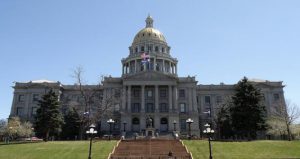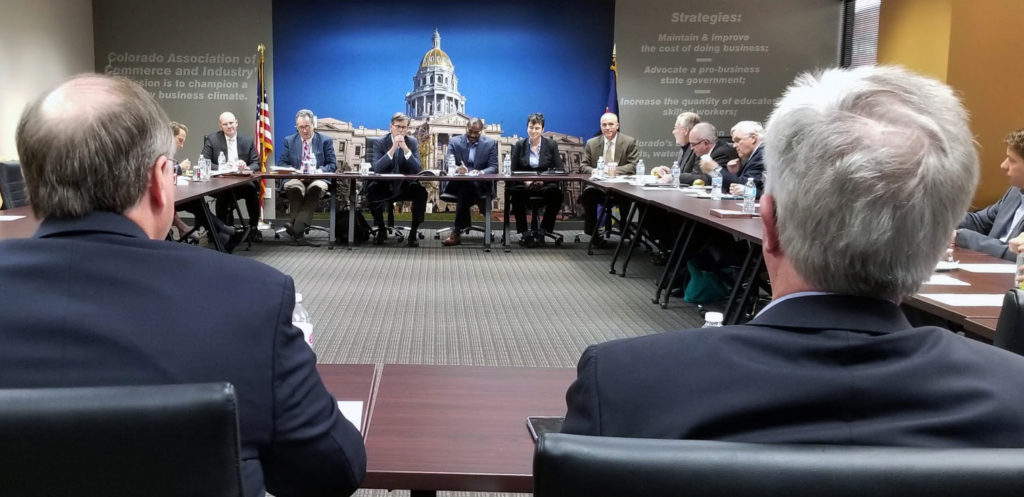In this Capitol Report:
Democrat-Controlled State Government Presents New Challenges for Business Community
 For the last four years under the Gold Dome, there have been generally two outcomes for legislation that have concerned the Colorado Chamber of Commerce.
For the last four years under the Gold Dome, there have been generally two outcomes for legislation that have concerned the Colorado Chamber of Commerce.
First, there has been confrontation: When bad-for-business bills from the Democrat-controlled House reached the Republican-controlled Senate, they died (see below).
Second, there has been collaboration: When House bills on which the Colorado Chamber and its business allies had successfully worked with the Democrat sponsors and some Republicans, the bills were then passed by the Senate (see below).
Split control between the House and Senate often forced the four caucuses of the two chambers to work through their differences to end with sound public policy.
The 2019-2020 Legislature
Now, for the first time in four years, Democrats have secured control of the governor’s office and both chambers of the legislature.
What does this mean for the Colorado Chamber’s members and the statewide business community that it represents?
“This outcome doesn’t change how we represent the interests of our members and employers across the state.,” said Loren Fuman, the Colorado Chamber’s veteran Senior Vice President for State and Federal Policy, “We are strong advocates for those that drive our economy while never just saying ‘no’ to new state policy proposals. I’m confident that we can find reasonable solutions as we’ve done time and time again and avoid alienating those that create thousands of jobs across the state.”
Reflecting on the Ballot Measures
“The defeat of Proposition 112 was a considerable relief as it would have brought devastating economic impacts for the workforce in all industry sectors – and not just in oil and gas jobs, said Loren, “I believe voters heard that message loud and clear.”
“The fight on this issue is far from over, however, and there is every indication that there will be efforts to continue to restrict fracking – it will just happen through the legislative process,” Loren said.
“The demise of Propositions 73 and 110 and other tax-increase ballot initiatives was surprising, based on how Coloradans voted the rest of the ticket,” Loren explained, “But it’s a reminder that voters here are still very reluctant to support more taxes and don’t want to live in a state that looks like California.”
“The 2018 elections are a reminder for state leaders, who may be considering the elimination of tax credits or exemptions for businesses, that these incentives are often the only way to bring companies to our state,” Loren said.
“As for finding ways to improve our roads, it’s likely we’ll see local jurisdictions ban together and try to fund improvements on their own versus pursuing a statewide funding solution,” said Loren.
Moderation in All Things?
First, the majority Senate Democrats might temper business-related legislation from the House that, in the past, was crafted and labeled “progressive” or “liberal” because the bills appealed to the base of the party, and the sponsors knew that the bills would not survive in the Senate. Thus, the Democrats saw no need to compromise as the bills were only intended to score political points.
Knowing that they will be able to put bills on the desk of Democrat Governor Jared Polis likely to sign them, the Senate Democrats may moderate their positions and work more closely with business organizations to take the concerns of the business community into account.
Senator Rachel Zenzinger (D-Arvada) recently told Ed Sealover, statehouse reporter for The Denver Business Journal, that concerns that that the Senate will steamroll the business community are unwarranted because there are pro-business moderates in the Democrat Caucus who are reticent to pass sweeping legislation that would slow the state’s economy and cost jobs.
The Colorado Chamber hopes that compromise between the legislature and the Governor and the business community will be the defining feature of the 2019 session.
Recent sessions have demonstrated that legislators and business organizations like the Colorado Chamber can work together to satisfactorily address issues that are important to the Democrats. Below are just a few of the bills that illustrate that successful collaboration:
- HB18-1256–Continuation of Civil Rights Commission
- HB18-1128–Data Privacy for Consumers
- HB18-1400–Increase in Air Quality Permit Fees
- SB 18-88 – Network of Providers
- SB 17-267 – Hospital Provider Fee
- HB 17-1001 – Parental Leave for Academic Activities
- SB 17-1269- allowing workers to share compensation information among themselves
- HB 16-1438 providing accommodations in the workplace for pregnant workers;
- SB 16-170 – Worker Misclassification
- HB16-1002–Employee Leave for Child’s Academic Activities
- HB16-1347–Employer Wage Law Violations
- HB16-1432–Inspection of Personnel Files
- SB15-107–Classification of Independent Contractors
- SB13-18–Permissible Use of Credit Information
(Note: HB stands for House bill and SB stands for Senate Bill. The number immediately after HB or SB is the year of the session; thus 18 means 2018, etc.)
The Difficult Issues
Here are some of the bills, which died in the Republican-controlled Senate in recent sessions, that the Colorado Chamber will likely face next session:
- A worker-funded by state administered, mandatory paid family-leave program;
- A worker-funded, state administered retirement savings program;
- “Ban the Box” to prevent employers from asking job applicants about criminal histories;
- Restrictions on the oil-and-gas industry;
- Allowing local governments to increase the minimum wage above the state minimum wage;
- Posting all job openings for all workers to see; and
- Requiring employers to disclose pay for workers by gender and national origin.
If Compromise Cannot Be Achieved . . .
The legislature’s majority Democrats and Democrat Governor Jared Polis may choose to charge ahead full-tilt with a progressive/liberal agenda that affects businesses.
If they do so, however, they will open themselves up to the charge that they are harming the state’s economy and business climate and costing jobs.
In that case, the Colorado Chamber will vigorously fight the bad-for-business bills throughout the legislative process and vocally urge Governor Polis to veto them.
For information about the elections, contact Loren at 303.866.9642
State House and Senate Caucuses Elect Their Leaders
This week, the State House and Senate Democrats and Republicans held their leadership elections to determine who would be controlling their respective caucuses. The leadership roles vary in responsibilities and include but are not limited to selecting the Chairs and Vice-Chairs of each committee, managing the activities on the House and Senate Floor, taking leadership positions on legislation and generally managing the members of their caucus.
The House Republicans maintained their current Minority Leader, Patrick Neville (R – Douglas) and House Democrats elected K.C. Becker (D – Boulder) who previously served as the House Majority Leader and Alec Garnett (D – Denver) as the Assistant Majority Leader.
In the Senate the leadership flipped to control by the Democrats who elected Leroy Garcia (D – Pueblo) as their Senate President who previously served as Senate Minority Leader, and Steve Fenberg (D – Boulder) as Senate Majority Leader. Below is the full list of House and Senate leadership selections:
House Republican Leadership
Minority Leader – Patrick Neville
Asst. Minority Leader – Van Winkle
Caucus Chair – Saine
Whip – Buck
Joint Budget Committee – Rankin
House Democrat Leadership
House Speaker – K.C. Becker
Majority Leader – Garnett
Assistant Majority Leader – Kennedy
Caucus Chair – Hooten
Deputy Caucus Chair – Michaelson-Jenet
Majority Co-Whips – Coleman & Bridges
Joint Budget Committee – to be announced
Senate Democrat Leadership
President – Garcia
Prez Pro Tempore – Court
Majority Leader – Fenberg
Asst Minority Leader – Fields
Caucus Chair – Winter
Whip – Donovan
Joint Budget Committee – Moreno & Zenzinger
Senate Republican Leadership
Minority Leader – Holbert
Ass’t Minority Leader – Cooke
Caucus Chair – Marble
Whip – Scott
Joint Budget Committee – Hisey
Colorado Chamber Hosts Department of Labor & Employment Leadership to Discuss State Policies that Impact Employers
This week, the Colorado Chamber of Commerce had the opportunity to hear from leadership at the Colorado Department of Labor & Employment who discussed the many policies, regulations and legislation that the Department implements and that impacts Colorado employers. Our guests included:
Sam Walker, Executive Director
Patrick Teegarden, Legislative Liaison
Paul Tauriello, Division Director, Workers Compensation
Alex Hall, Division Director & Chief Economist, Division of Labor, Standards & Statistics
Jeff Fitzgerald, Division Director, Unemployment Insurance
During the meeting, Executive Director Walker and the Division Directors discussed several topics and a snapshot of the discussion is provided below:
Comments by Sam Walker, Executive Director:
- Focusing the Department on growing apprenticeships opportunities and helping the younger generation learn about the workforce;
- Putting an emphasis on work-based learning and high school apprenticeships;
- Helping create apprenticeships for at least 10% of high school students;
- Wants to encourage opportunities for individuals seeking employment.
Comments by Paul Tauriello, Division Director, Workers Compensation
- Not anticipating many significant changes to the workers compensation (WC) system;
- Many of the 2018 WC changes are being implemented through rulemaking process now;
- Noted the adoption of a Departmental rule on independent medical evaluations which affects insurers who write WC policies in Colorado.
Comments by Alex Hall, Division Director, Division of Labor & Statistics
- Discussed the current wage laws and efforts by the Division to help employers understand the current wage laws;
- Alex shared that there is still confusion by employers when they administer deductions in pay checks and how to address vacation benefits;
- Concerns were raised by a Colorado Chamber member regarding the current Wage Order and how improvements could be made.
Comments by Jeff Fitzgerald, Division Director, Unemployment Insurance
- Discussed the status of the Unemployment Insurance Trust Fund (UITF) which is at its highest level ever and is expected to have a healthy status for the next 18 months;
- The wage base is expected to increase to $13,900 for employers based on prior legislation which will impact premiums;
- Jeff raised concerns that the wage base increase would not be sustainable for maintaining a healthy trust fund if Colorado experiences a recession.
Comments by Patrick Teegarden, Legislative Liaison
- Provided an update on the Carpenters’ Task Force which has been focused on behavior of subcontractors in the commercial construction industry. TF has been meeting all summer and a report will be released shortly;
- Discussed anticipated legislation for 2019 known as the Family Medical Leave Insurance Program which has been attempted three legislative sessions in a row. Department is open to working with legislators and stakeholders on this issue to determine how a program can be funded and how it can function effectively.
Please contact Loren Furman at [email protected] or at 303-866-9642 if you should have any questions regarding this meeting or if you would like to participate in future Colorado Chamber Labor & Employment Council meetings.
Thank you!

